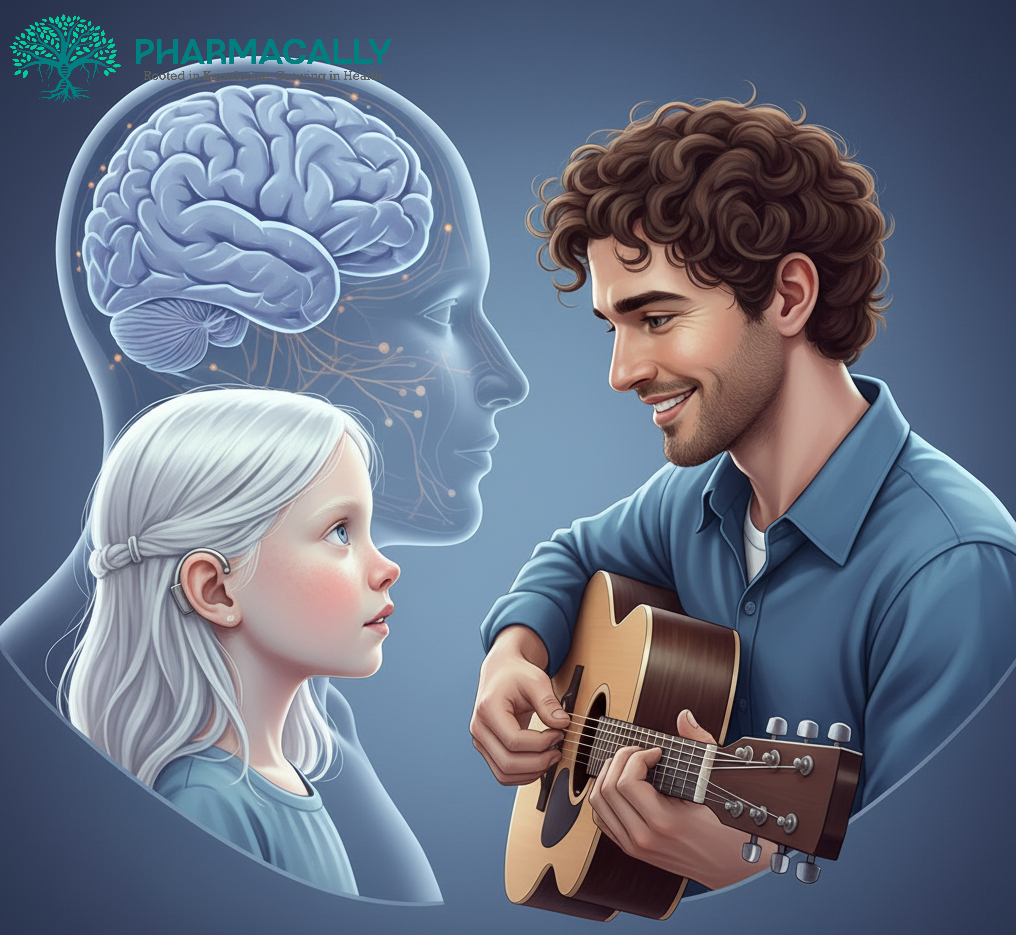Written By: Pharmacally Medically New Desk
Regeneron Pharmaceuticals has announced ground-breaking results from its investigational gene therapy DB-OTO, designed to treat profound genetic hearing loss caused by mutations in the otoferlin (OTOF) gene. Trial Results are published in The New England Journal of Medicine, the data from the Phase 1/2 CHORD clinical trial show that nearly all treated pediatric patients experienced significant hearing improvements, with some achieving normal hearing levels. This first-of-its-kind dual-vector gene therapy offers new hope for children born with hereditary deafness, a condition previously considered irreversible. The therapy works by delivering a functional copy of the defective gene directly to the inner ear, restoring natural hearing and speech perception. With plans to submit for FDA approval by the end of 2025, DB-OTO could transform treatment for this ultra-rare genetic disorder and pave the way for future gene therapies targeting inherited deafness.
About DB-OTO Therapy
DB-OTO is an adeno-associated virus (AAV)-based dual-vector gene therapy that delivers a functional copy of the OTOF gene directly into the inner ear. The therapy aims to restore natural acoustic hearing by enabling synaptic transmission between hair cells and auditory neurons, which is disrupted in patients with OTOF mutations. DB-OTO is administered by intracochlear infusion, targeting profound hearing loss patients who, prior to treatment, had little to no ability to perceive everyday sounds such as speech or environmental noise.
How DB-OTO Was Developed
The OTOF gene encodes otoferlin, a protein crucial for neurotransmitter release at the inner hair cell synapse, essential for auditory signal transmission. Mutations in OTOF cause profound congenital deafness by disrupting this process. The large size of the OTOF gene posed significant challenges for gene therapy development. Regeneron’s innovative dual AAV vector system addresses this by splitting the OTOF gene into two parts that recombine inside the target cells to restore gene function. This approach was developed after extensive preclinical studies and early clinical trials that demonstrated feasibility, safety, and preliminary efficacy.
Hereditary Hearing Loss
Hereditary hearing loss affects millions worldwide, with genetic causes responsible for over 50% of childhood deafness. OTOF-related hearing loss is a rare autosomal recessive disorder that presents as profound congenital deafness. Traditional treatment options, such as cochlear implants, provide electrical stimulation to the auditory nerve but do not restore natural hearing. Gene therapy has emerged as a revolutionary approach aimed at correcting the underlying genetic defect. Until now, no gene therapy for OTOF-related deafness had achieved clinical success, making DB-OTO the first of its kind.
Clinical Trials Details
Study Design
The pivotal Phase 1/2 CHORD trial (NCT05788536) is an open-label study evaluating the safety and efficacy of DB-OTO in pediatric patients with profound hearing loss due to OTOF mutations. The trial enrolled 12 patients (15 treated ears) with eligibility defined by profound hearing loss, characterized as an inability to hear sounds louder than a gas-powered lawn mower. Patients received intracochlear injections of DB-OTO and were monitored for up to 72 weeks post-treatment.
The primary efficacy endpoint was the proportion of patients achieving a hearing threshold of 70 decibels hearing level (dBHL) or better, measured at 24 weeks post-treatment via behavioral pure tone audiometry. Secondary endpoints included response durability, speech perception improvements, and auditory brainstem response thresholds.
Results
11 of 12 treated patients demonstrated clinically significant hearing improvements.
3 patients achieved normal hearing levels.
9 patients met the primary endpoint by 24 weeks.
6 patients could hear soft speech without device assistance.
3 patients could detect whisper-level sounds.
Improvements were rapid, with responses seen within weeks.
Continued hearing stability or further improvement was observed in 8 patients followed beyond 36 weeks, lasting up to 72 weeks.
Among 3 patients with speech assessments at 48 weeks, significant gains including word recognition without visual cues were confirmed.
Safety Profile
DB-OTO and its surgical administration were generally well tolerated. No adverse events were attributed directly to DB-OTO. Some transient vestibular side effects related to the surgical procedure, such as nausea, dizziness, and nystagmus, were reported but resolved fully. Two serious adverse events occurred one related to cochlear implant surgical complications and one associated with vaccination during the study. No gene therapy-related serious adverse events were observed.
Implications for Patients and Future Projections
This gene therapy represents a transformative opportunity for children born with OTOF-related deafness, offering the possibility of natural hearing restoration without reliance on cochlear implants. The therapy has received multiple FDA designations including Orphan Drug, Rare Pediatric Disease, Fast Track, and Regenerative Medicine Advanced Therapy status, underscoring its potential impact. Regeneron plans to submit a regulatory application to the FDA by the end of 2025. Success with DB-OTO may also encourage earlier genetic testing in hearing loss patients and stimulate broader gene therapy development for other forms of genetic deafness. A patient’s parent expressed their profound gratitude, stating, “Their situation is now ‘unimaginable’ from one year ago.” This powerful testimony underscores the transformative potential of DB-OTO.
Key Opinions
Lawrence R. Lustig, MD, Chair of Otolaryngology at Columbia University and a key investigator in the CHORD trial, described the results as signaling “a new era in the treatment of hearing loss,” highlighting rapid, robust, and sustained responses alongside meaningful speech improvements. Dr. Vassili Valayannopoulos, Regeneron’s Executive Medical Director, noted the therapy’s capacity to enable natural acoustic hearing and emphasized benefits extending to patients up to 16 years old, challenging the belief that gene therapy is only effective in very young children. Company officials expressed optimism about DB-OTO’s imminent FDA submission and its potential to transform care for a rare deafness population.
References
DB-OTO Results in the New England Journal of Medicine Showcase Dramatic and Sustained Improvements in Hearing and Speech Perception in Children with Profound Genetic Hearing Loss, 12 Oct 2025, Regeneron, https://investor.regeneron.com/news-releases/news-release-details/db-oto-results-new-england-journal-medicine-showcase-dramatic
V. Valayannopoulos et al, DB-OTO Gene Therapy for Inherited Deafness, N Engl J Med, published on October 12, 2025, DOI: 10.1056/NEJMoa2400521
A Study of DB-OTO, an Adeno-Associated Virus (AAV) Based Gene Therapy, in Children/Infants with Hearing Loss Due to Otoferlin Mutations (CHORD), ClinicalTrials.gov ID NCT05788536, https://clinicaltrials.gov/study/NCT05788536

